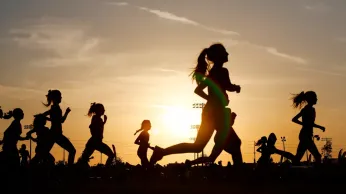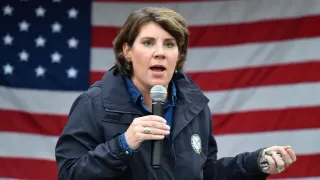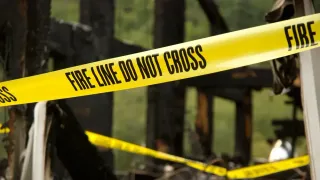
4 hours ago
Trump Administration Says Minnesota Violated Civil Rights by Allowing Transgender Girls to Compete in High School Sports
READ TIME: 4 MIN.
Federal officials from the U.S. Department of Education and the Department of Health and Human Services announced this week that Minnesota’s high school sports authority and education department are in violation of Title IX by allowing transgender girls to compete in girls’ athletic programs. This decision comes after months of investigation, igniting a national debate on the intersection of civil rights, gender identity, and athletic competition in schools .
Shortly after assuming office for his second term, President Donald Trump signed an executive order titled "Keeping Men Out of Women’s Sports," which bans transgender girls and women from participating in female-designated athletic programs in schools that receive federal funding. The order was part of a broader effort by the administration to restrict transgender athletes’ participation in sports categories consistent with their gender identity, citing concerns over fairness and safety .
The investigation centered on the policies of the Minnesota State High School League (MSHSL) and the Minnesota Department of Education (MDE), which have permitted students to participate in athletic teams matching their gender identity since 2014. According to the Department of Education’s Office for Civil Rights, these policies allowed transgender girls to join Alpine and Nordic skiing, lacrosse, track and field, volleyball, and fastpitch softball teams alongside cisgender peers .
A high-profile example cited by federal officials involved Marissa Rothenberger, a transgender pitcher who played for Champlin Park High School’s girls’ softball team and helped secure a state championship, striking out 27 batters and allowing only one earned run across 35 innings .
The Department of Education and Health and Human Services have given Minnesota a 10-day deadline to alter its policies to comply with federal directives. If Minnesota does not comply, the agencies have threatened to refer the matter to the Department of Justice and potentially withhold hundreds of millions of dollars in federal education funding from the state .
Additionally, Minnesota is required to “restore to female athletes all records and titles misappropriated by male athletes competing in female categories,” and to issue apology letters to affected athletes .
Craig Trainor, Acting Assistant Secretary for Civil Rights at the DOE, stated, “The Trump Administration will not allow Minnesota or any other state to sacrifice the safety, fair treatment, and dignity of its female students to appease the false idols of radical gender ideology. Once an education program or entity takes federal funds, Title IX compliance becomes mandatory. And the federal government will hold Minnesota accountable until it recognizes that fact” .
Minnesota officials and civil rights advocates have condemned the federal findings and the executive order, framing the actions as an attack on transgender students’ rights and state autonomy. Minnesota Attorney General Keith Ellison has filed a lawsuit against the federal government, seeking to block enforcement of the executive order and preserve the state’s existing policies, which allow students to participate in sports consistent with their gender identity .
The Minnesota State High School League has reaffirmed its commitment to upholding state law and ensuring all students, including transgender youth, have the opportunity to compete and be included in school sports. “We will continue to abide by state law, which allows students to participate in sports based on their gender identity,” the MSHSL said in a recent statement .
LGBTQ+ advocacy organizations have denounced the federal government’s actions, warning that policies banning transgender athletes from gender-affirming sports teams endanger the mental health and well-being of transgender students. National organizations such as the Human Rights Campaign and GLAAD have pointed to research showing that participation in school sports is linked to better academic outcomes and social integration for transgender youth .
While the federal investigation singled out 11 transgender athletes who participated in Minnesota high school sports, this represents a fraction—approximately 1 in 21,122—of the more than 232,000 student athletes in the state during the 2024-2025 school year .
Minnesota lawmakers, who declared the state a “trans refuge” in 2023, emphasized their commitment to protecting transgender students’ rights, signaling a willingness to fight any loss of federal funding and continue legal battles with the federal government .
The Minnesota case is one of several high-profile clashes between the Trump administration and states or school districts that have adopted inclusive policies for transgender athletes. Federal authorities have filed similar lawsuits against education agencies in Maine and California, increasing the national stakes for transgender rights in school sports .
Civil rights experts warn that the outcome of these legal battles could have far-reaching consequences for Title IX interpretation, school funding, and the civil rights of transgender people nationwide. As the legal process unfolds, transgender student-athletes in Minnesota and across the country face renewed uncertainty about their ability to compete in accordance with their gender identity.
The next steps for Minnesota include a possible policy rewrite, pending court decisions, and continued advocacy both for and against the participation of transgender athletes in girls’ sports. School officials, students, and families remain caught in the middle as federal and state governments clash over how best to ensure fairness, inclusion, and equal opportunity for all young people.
Advocates have vowed to continue supporting transgender students and challenging any attempts to curtail their rights. As federal deadlines loom and legal proceedings advance, the outcome in Minnesota is poised to shape the future of school sports and civil rights protections for LGBTQ+ youth across the United States.






